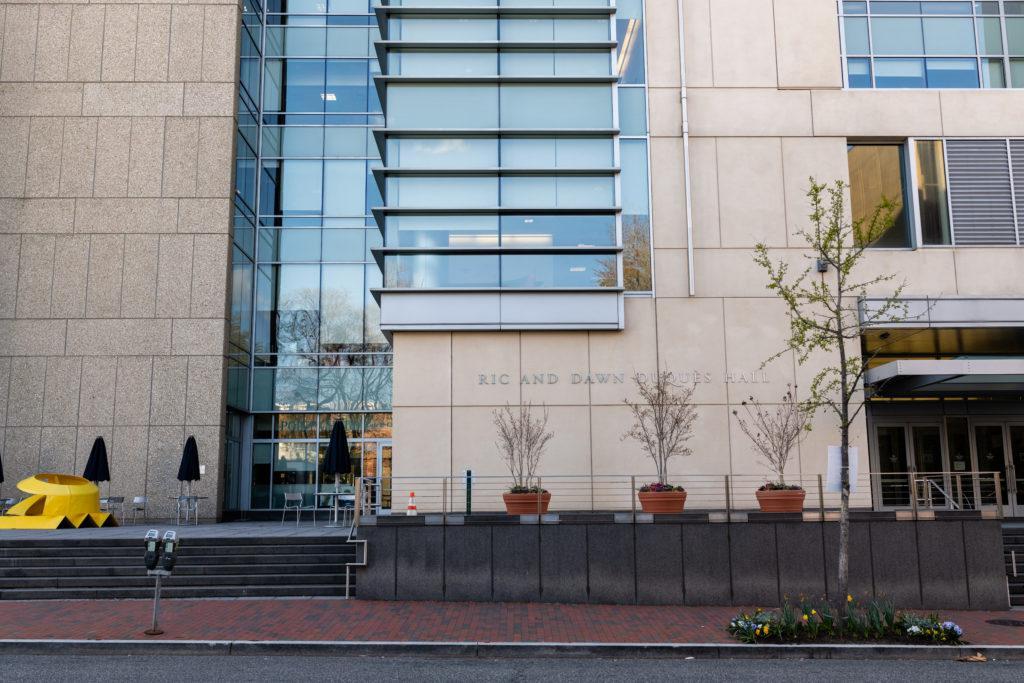Updated: Sept. 14, 2020 at 5:05 p.m.
The School of Business is revamping its accountancy capstone program for next semester to allow students to engage in semester-long partnerships with U.S.-based companies.
The three-credit course, Financial Accounting Capstone, provides seniors majoring in accountancy with hands-on opportunities and experience to develop a greater understanding of the profession of accounting, officials said. As the last course in the accountancy major’s curriculum, students will partner with businesses to tackle challenges that those in the industry face like tax planning, officials said.
Yun Zhang, an associate professor of accountancy who is in charge of redesigning and teaching the class, said the program previously focused on “in-class experience.” He said he hopes the new structure will introduce students to accounting in “real-world settings,” adding that officials are still working to confirm specifics about the potential partnerships for students.
“My philosophy for teaching this course is to have a completely consulting orientation,” he said. “Essentially, what we would do in my class is we will partner with organizations and businesses outside of GW.”
Zhang said this collaboration will allow students to apply skills that they learned in the classroom over their four years and demonstrate to future employers they have training in real-world accounting on top of textbook accounting.
“I am hoping this course will open a door or window for my students to get them a firsthand experience of what they are going to taste later in their careers,” he said.
Zhang said students will have “a lot of discretion” in determining their consulting objectives with the businesses they collaborate with like assistance in business reorganization and accounting information systems.
“Once they get on this project, they will be in constant touch with those companies, and they would reach a mutual agreement in terms of what the final project, delivery or presentation on paper will be on,” he said. “Essentially, it is a negotiation process.”
He said the course is still under development, and he is currently working with the Global and Experiential Education program and business school alumni to secure at least five U.S.-based companies by the end of the year, with each to host roughly six to seven students.
Sarah LaRosa – the assistant director of the Global and Experiential Education program, which supports students in the business school in outreach and international initiatives – said the capstone program will allow students to “synthesize” their scholarship with direct opportunities in accountancy.
She said the course will provide an “integral skill-building experience” for students and “pro-bono business insights” for partnering businesses.
LaRosa said several alumni who work in the private and public sector have expressed interest in supporting the capstone, and 45 seniors are currently enrolled in the accountancy program.
Robin Tarpley, the chair of the accountancy department, said the course will also underline communications skills, which she said are vital for the profession, and will prepare students for the workplace when the time comes.
“People don’t realize that accounting is heavily reliant on communications, and it is important,” she said. “We want to also foster that as well to give them a world-rounded professional experience out of the course.”
Accounting experts said the overhaul of the course will familiarize students with practical experience in the industry prior to graduation.
Don Williamson, a professor in the accounting and taxation department at American University, said this course will allow seniors to get their “feet wet” and make them more appealing to future employers.
“I applaud this effort very much because some experiential learning coupled with traditional classroom experience will really make the student a much better business adviser,” Williamson said.
Williamson said the capstone will act as a “transition” between the students’ collegiate and professional careers that will enhance their resumes. He said partnering companies and organizations also benefit from this exchange with access to free consultation work.
Kevin Jones, the program director of the master of science in accounting program at George Mason University, said the course will be an “immersive environment” for students to explore what area of accountancy they may wish to pursue after graduating like auditing and taxation.
Jones said he didn’t have access to an experience like this when he was in college and encourages students to “take advantage of it,” especially because of the challenges in the industry posed by COVID-19 like job insecurity.
“To the extent that you have a program that is getting the students into actual businesses, they may impress somebody and be able to get a permanent job offer that way,” he said.
This post has been updated to correct the following:
The Hatchet incorrectly reported that LaRosa said the course will provide “pro-bono business insights” for students. She said the course will provide this for patterning businesses. We regret this error.








